Glass Facades in Thrissur
Modern architecture is typified by its glass facades in Thrissur.
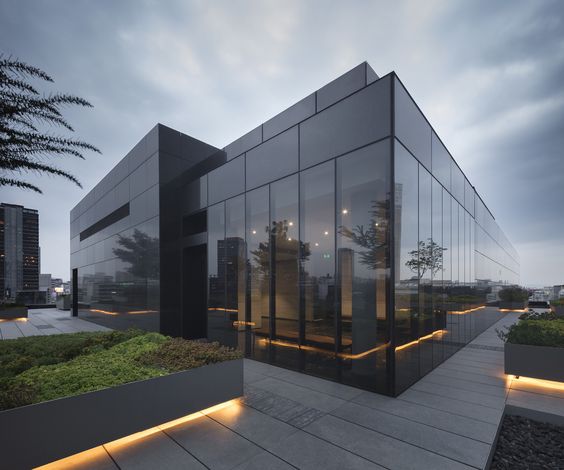
Glass facades in Thrissur are the external walls of buildings that are mainly composed of glass and are frequently supported by aluminum or other structural elements. They are made to have a transparent or translucent outer layer that lets light from the sun stream deep into the interior areas. Glass facades can be used to cover an entire building’s façade or mixed with other materials to make statement pieces in architecture.
Benefits of Glass Facades:
1. Aesthetic Appeal: Glass facades provide a structure a sleek, contemporary appearance that improves the building’s overall architecture. With a variety of hues, coatings, and patterns, they can be made to have a sleek, clean look.
2. Natural Light: Increasing the amount of natural light inside a structure is one of the main advantages of glass facades. This lowers energy expenses and lessens the need for artificial lighting in addition to making the space bright and welcoming.
3. Energy Efficiency: Glass facades can increase a building’s energy efficiency provided the proper glass and coatings are used. Excellent insulation is provided by low-emissivity (Low-E) glass and double or triple glazing choices, which lessen heat transmission and maintain pleasant interior temperatures.
4. Environmental Benefits: By enhancing energy efficiency and utilizing recyclable resources, glass facades can support environmentally friendly building techniques. Additionally, they are in favor of biophilic design ideas, which highlight the interdependence of humans and the natural world.
5. Versatility: Glass facades allow architects to construct inventive and one-of-a-kind structures because they give design versatility. They can be utilized in a variety of building types, including residential residences, cultural institutions, and office and tower structures.
6. Improved Views: Glass facades offer clear views of the surroundings, strengthening the bond between the outside and inside areas. This is especially useful in scenic areas and urban settings.
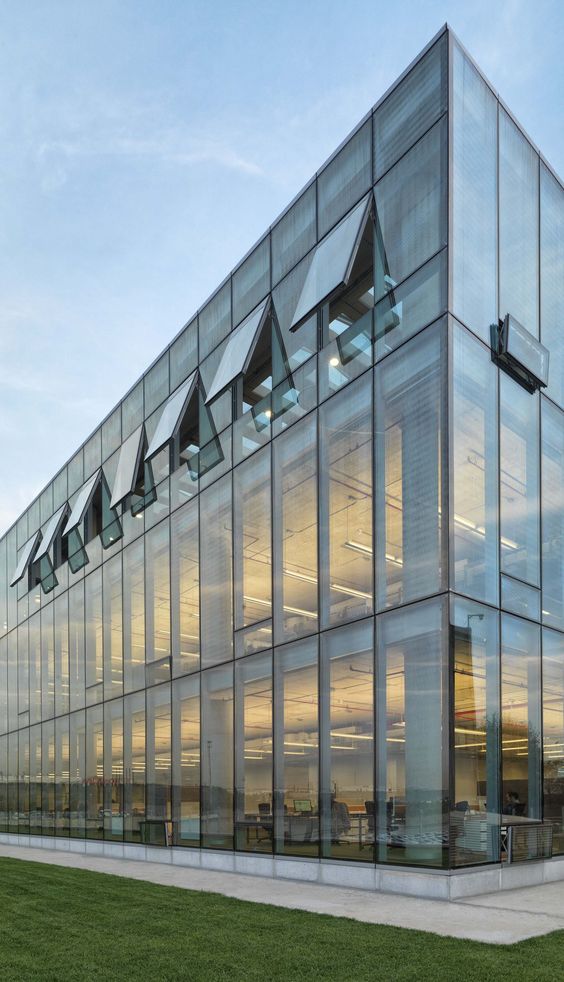
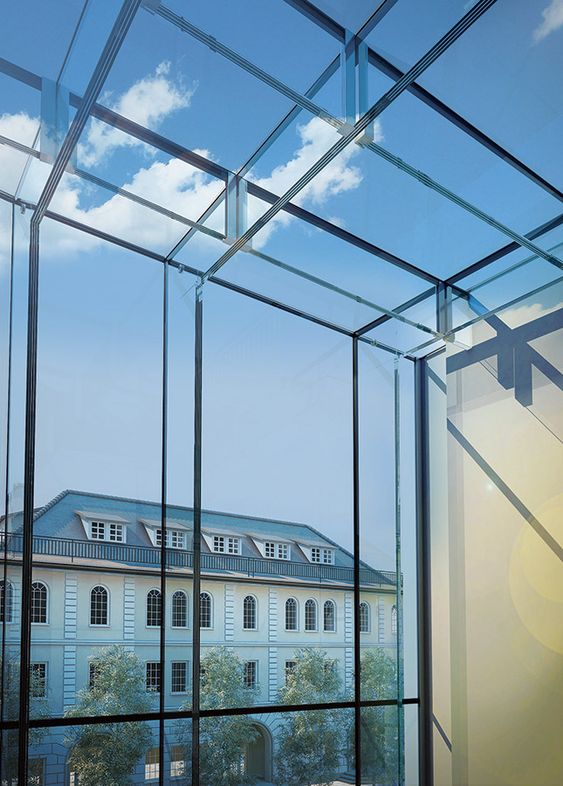
Types of Glass Facades:
1.) Systems of Curtain Walls:
Non-structural cladding systems called curtain wall systems in Thrissur are fastened to the building’s structural structure. These systems are made to be both aesthetically pleasing and weather-resistant, and they can span several levels in addition to offering insulation.
Benefits:
1. Usually made out of glass panels and aluminum frames.
2. Unitized (pre-assembled) or stick-built (on-site) installation options are available.
3. Permits a large amount of glass coverage without compromising the building’s structural integrity.
Applications:
1. Towering buildings
2. Business structures
3. Sizable office buildings
2.) Glass facades with fixed points:
Point-fixed glass facades in Thrissur usually include stainless steel fittings or bolts holding the glass panels in place, requiring little structural support. This kind of facades increases the transparency of the structure by providing a clear, continuous view.
Benefits:
1. Uses metal fasteners to fasten glass panels, such as rotules or spider fittings.
2. Creates a frameless appearance to maximize light and visibility.
3. Frequently paired with additional structural components like cables or tension rods.
Applications:
1. Expensive office towers
2. Gallery spaces and museums
3. Lobbies and atriums
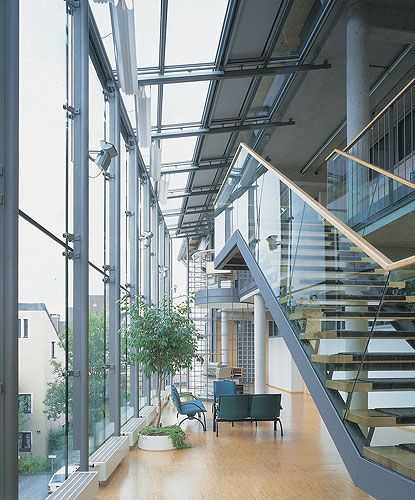
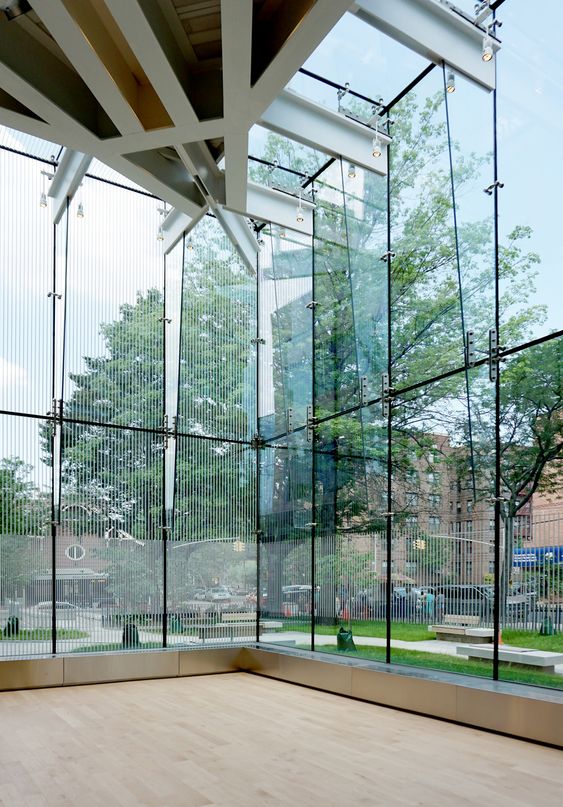
3.) Glass facades with units:
Prefabricated components are built in a factory before being put on-site to create unitized glass facades in Thrissur. Higher quality control and quicker installation timeframes are guaranteed with this procedure.
Benefits:
1. Faster installation and improved quality control are made possible by prefabrication.
2. Shortens installation and labor times on-site.
3. The glass and framing components are included with every unit.
Applications:
1. Tall structures
2. Workplace buildings
3. Accommodations
4.) Systematic Glazing Structures:
Using high-strength silicone sealants, glass panels are bonded to the structural frame in structural glazing systems in Thrissur. By using this method, external framing is not necessary, leaving the facades looking smooth and modern.
Benefits:
1. Offers a continuous, smooth glass surface.
2. Silicone adhesives are used to directly bind the glass to the structural framework.
3. Suitable for skylights and curtain wall systems.
Applications:
1. Contemporary office complexes
2. Shop facades
3. Airports
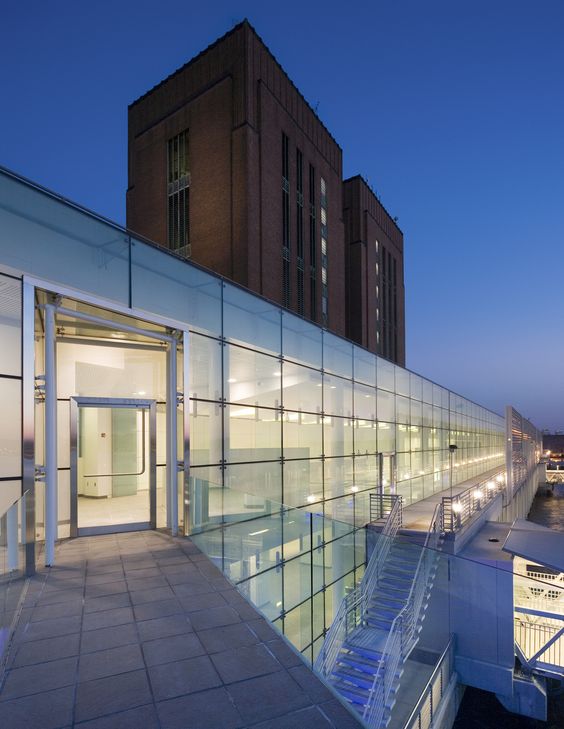
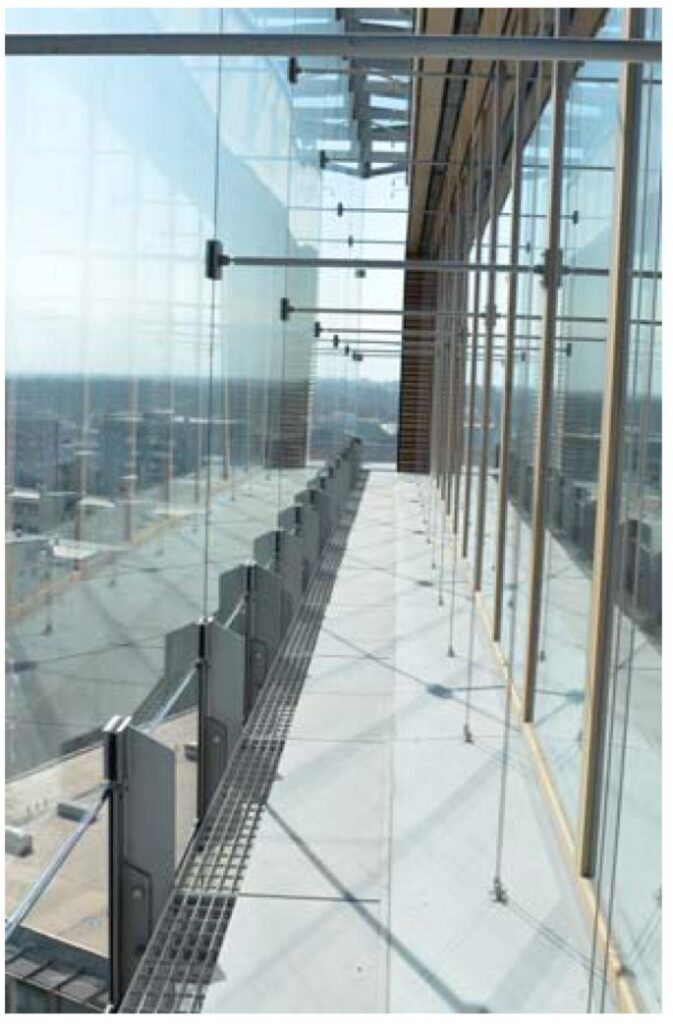
5.) Facades with Two Skins:
Double-skin facades in Thrissur are made up of two glass layers that are divided by an air gap. Both natural ventilation and improved thermal performance are provided by this design.
Benefits:
1. By serving as an insulator, the air cavity lowers heat gain and loss.
2. Promotes natural ventilation and increases energy efficiency.
3. The outermost layer might offer weather protection and shade.
Applicants:
1. Buildings with low energy use
2. Towering office buildings
3. Structures owned by institutions
6.) Glass Facades for Cable Nets:
A system of tensioned cables is used in cable net glass facades in Thrissur to support the glass panels. This kind of facades provides low structural intrusion and a high degree of transparency.
Benefits:
1. Holds glass panels in place using stainless steel cables that are tensioned.
2. Offers a facade that is both lightweight and translucent.
3. Perfect for making expansive glass surfaces without requiring a lot of frame.
Applications:
1. Generous atriums
2. Terminals at airports
3. Stadiums for sports
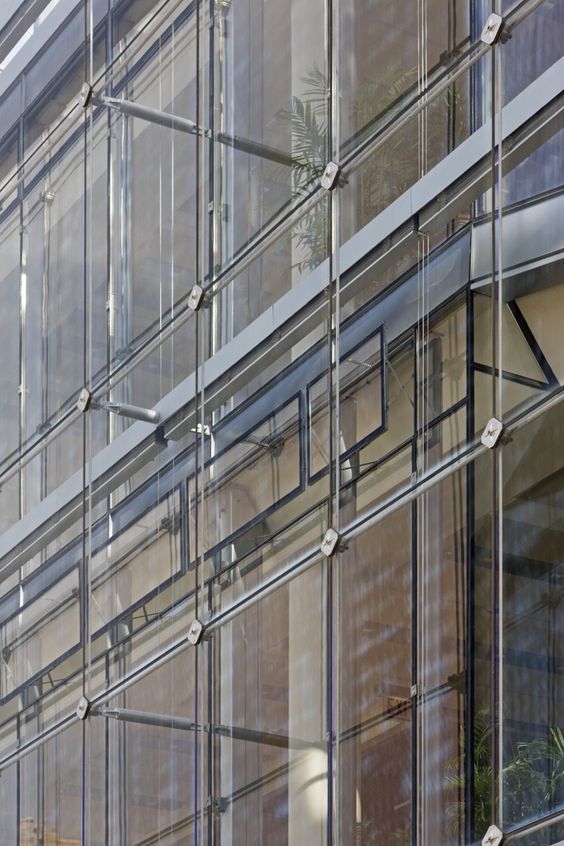
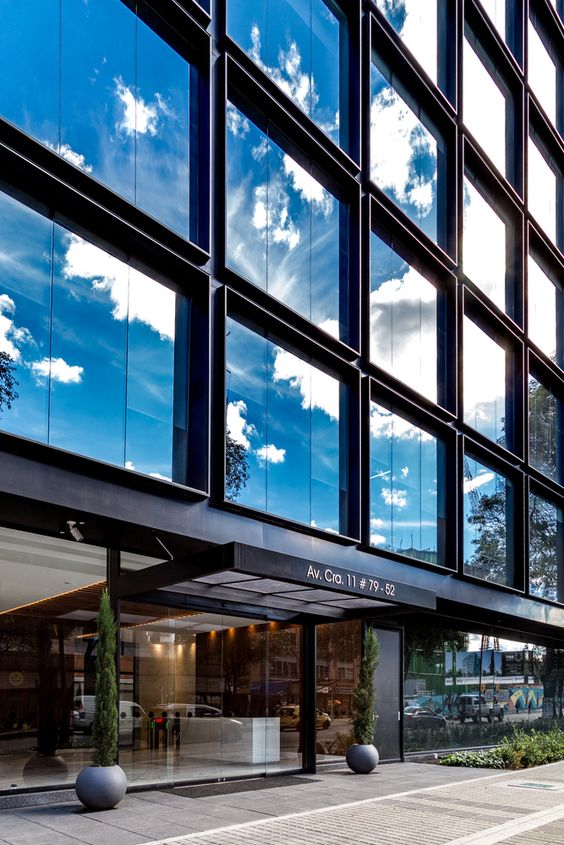
7.) Intelligent Glass Fronts:
Glass panels in smart glass facades in Thrissur have the ability to alter their transparency or tint in response to user controls or environmental factors. Energy efficiency and comfort are improved by this technique.
Benefits:
1. Has the ability to change from clear to opaque for solar control or privacy.
2. Manually or automatically with the use of sensors.
3. Increases energy efficiency by lowering the demand for air conditioning and artificial lighting.
Applications:
1. Contemporary office complexes
2. Towering residential buildings
3. Public structures
Procedure for Installation:
1. Consultation and Design: Complete the requirements and specifications for the design.
2. Site Evaluation and Setup: Examine the location and make necessary arrangements.
3. Fabrication: Produce glass panels and parts for framing.
4. Delivery and Handling: Securely move and store goods.
5. Installing the Framing System: Assemble and straighten the frames.
6. Glass Panel Installation: Align and fasten glass panels.
7. Insulation and Sealing: Install insulation and sealants.
8. Quality Control and Inspection: Conduct tests and inspections of installations.
9. Final Touches: Replace the flashing, install the trim, and wash the glass.
10. Final Inspection and Handover: Carry out a final examination and give instructions for maintenance.
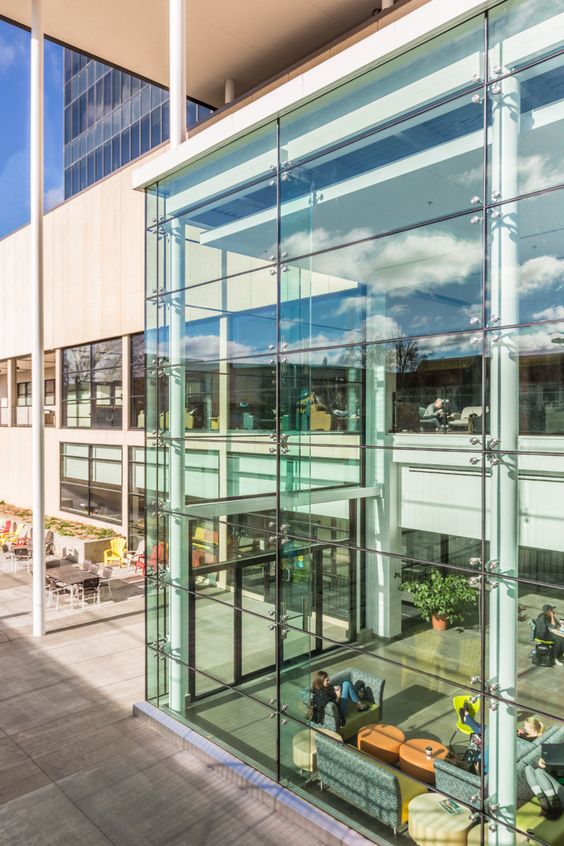
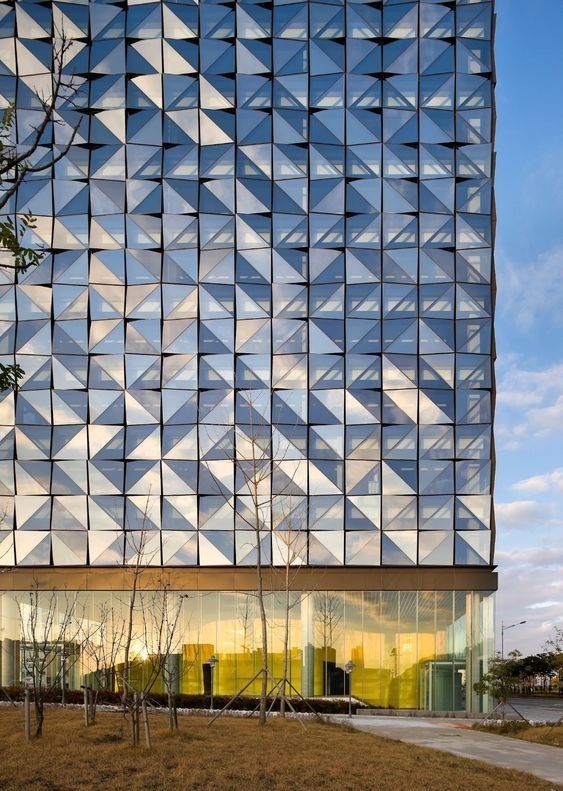
Maintenance and Concern:
1. Routine Cleaning: Use a soft cloth or squeegee along with a moderate glass cleaner.
2. Damage Inspection: Occasionally look for chips, cracks, and loose fittings.
3. Repair and Replacement: Take care of small blemishes and quickly replace badly damaged panels.
4. Preventive Steps: Use shading devices and protective films.
5. Seasonal Maintenance: Clear gutters and drains; check weatherproofing and seals before severe weather.
6. Professional Inspections: Arrange for yearly inspections by professionals.
7. Documentation: Keep track of all maintenance performed and warranty papers.
8. Environmental Aspects: Maintain energy efficiency and use environmentally friendly cleaning supplies.
Frequently Asked Questions
Tempered, laminated, insulated, and low-emissivity (Low-E) glass are common glass types used in facades. Benefits including improved strength, safety, thermal insulation, and energy efficiency vary depending on the material.
Depending on the type of glass, complexity of the design, scale of the building, and installation needs, costs might differ significantly. Because glass facades are aesthetically pleasing, practical, and energy-efficient, they are typically regarded as investments.
Yes, glass facades can dramatically increase a building’s energy efficiency by minimizing heat transfer and enhancing insulation through the use of insulated glass units (IGUs), low-emissivity (Low-E) coatings, and double or triple glazing.
Contemporary glass facades are incredibly robust. Options for laminated and tempered glass offer increased robustness and security. The lifespan of the facade is further ensured by proper installation and maintenance.
In order to satisfy certain design and practical needs, glass facades can be highly tailored in terms of size, shape, tint, coatings, and framing materials.
Request a Free Quote
Are you prepared to change your area with our superior glass options ? For a free quote, get in touch with us now.
